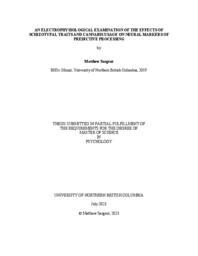Gingerich, Andrea
Person Preferred Name
Andrea Gingerich
Related Works
Content type
Digital Document
Description / Synopsis
The brain’s ability to make predictions has long been of interest to cognitive neuroscientists, who have used techniques including electroencephalography (EEG) to study this phenomenon. A component of neurophysiological activity, termed the Semantic Predictive Potential (SPP), may be an indicator of people’s ability to predict the nature of upcoming semantic content. Interestingly, a body of theoretical and experimental work suggests that people with schizophrenia and people who regularly use cannabis have difficulty making predictions about information in their environments. We explored how schizophrenia-like traits and cannabis use affected the SPP. Participants read sentences which differed in the predictability of their endings while brain activity was monitored using EEG. Participants then completed questionnaires assessing their levels of schizophrenia-like traits and cannabis use. We replicate previous findings suggesting that the SPP is sensitive to semantic predictability, and show that schizophrenia-like traits and cannabis use interact with semantic predictability to influence the SPP.
Origin Information
Content type
Digital Document
Description / Synopsis
Grounded cognition is a theoretical stance that suggests that sensorimotor simulation is constitutive of knowledge. I sought to investigate the role of sensorimotor simulation in higher-level conceptual tasks, such as reading and categorization. Body Ownership Illusions (BOIs) were used to interfere with effector-specific representations. Using Representational Similarity Analysis (RSA) of Electroencephalographic (EEG) data, I identified time points during which representations of different information were active. The neural geometry was compared to two different hypothesized representational geometries. The hypothesized representational geometries were constructed from ratings about effector and sensorimotor information. During the control conditions, two distinct types of information were represented early in the epoch: information about the effector and information about the sensorimotor profile of the word. In the illusion condition, both effector and sensorimotor information representations were pushed to later time points in the epoch. These results demonstrated that sensorimotor and effector information are represented when reading in normal conditions, which supports a weak grounded cognition position, whereby sensorimotor information is activated as we understand concepts. In the illusion conditions, the typical representation of action concepts was disrupted, supporting the hypothesis that BOIs could be used to interfere with concept representation during the understanding of verbs. Effector-specific illusions effects were inconclusive; there was no consistent pattern for hand words in the hand illusion or foot words in the foot illusion. Thus, I did not provide evidence that the information that serves concept representation is effector specific.
Origin Information


